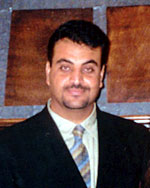By Mary Stucky
Minnesota Public Radio
December 7, 2001
|
| RealAudio |
The country's only literary journal with writing by Arab Americans is published in Minneapolis. It's called Mizna, an Arabic word for desert cloud, a symbol of shelter and hope. Mizna's editors hope the journal will create understanding across cultures.
| |
|
|
|
||
Mizna started two years ago, but according to Fouzi Slisli, it's really needed now, since Minnesotans know almost nothing about Arab Americans.
Mizna publishes acclaimed writers like Palestinian-American poet Naomi Shihab Nye. It also carries the work of novice writers, including local poet Nahid Khan. Of South Asian decent , Khan is not Arab, but says like Arab Muslims, she's stereotyped.
"For me the kind of questioning is the kind that's condescending. 'Where are you from?' assumes 'I'm from here, you're from somewhere else, you must have an interesting story. Entertain me, because you're different," she says.
It may seem strange that the country's only Arab American literary journal is published in Minnesota, but Mizna's editors say arts funders here support projects highlighting minority cultures.
According to Mizna Executive Director Kathryn Haddad the best known Arab American writer is Kahlil Gibran, who wrote The Prophet. Born in Lebanon, Gibran died in the U.S. in 1931.
|
"Where are you from?
they ask me. A one-word answer is all they want. But I cannot be captured within one word." - "To Be a Muslim in Minnesota" Nahid Khan Read the entire poem |
"He is actually the one who said, 'Ask not what your country can do for you, but ask what you can do for your country.' People attribute that to John F. Kennedy and Kennedy was actually quoting Gibran. I find a great irony in that actually in these times," Haddad says.
That irony is not lost on Fouzi Slisli. While he is yet to be approached, he says he expects to be one of the young men of Muslim and Middle Eastern descent, questioned as part of the Justice Department's post-Sept. 11 investigation.
Slisli says he thinks that's an oversimplistic approach, to a deep-seated problem. He says Sept. 11 was a horrible tragedy, but say military action in Afghanistan is not the way to root out terrorists.
"You cure terrorism by getting rid of the social conditions that create it. You don't defeat it, you never defeat terrorism. What makes us sure that among our new allies, the Northern Alliance, there are no bin Ladens?" says Slisli.
He says another useful weapon against terrorism is simply understanding different cultures. Slisli says literature can help.
Mizna's current issue is dedicated to the victims of Sept. 11 and its aftermath, which is also expected to be a subject in upcoming issues.
More Information
